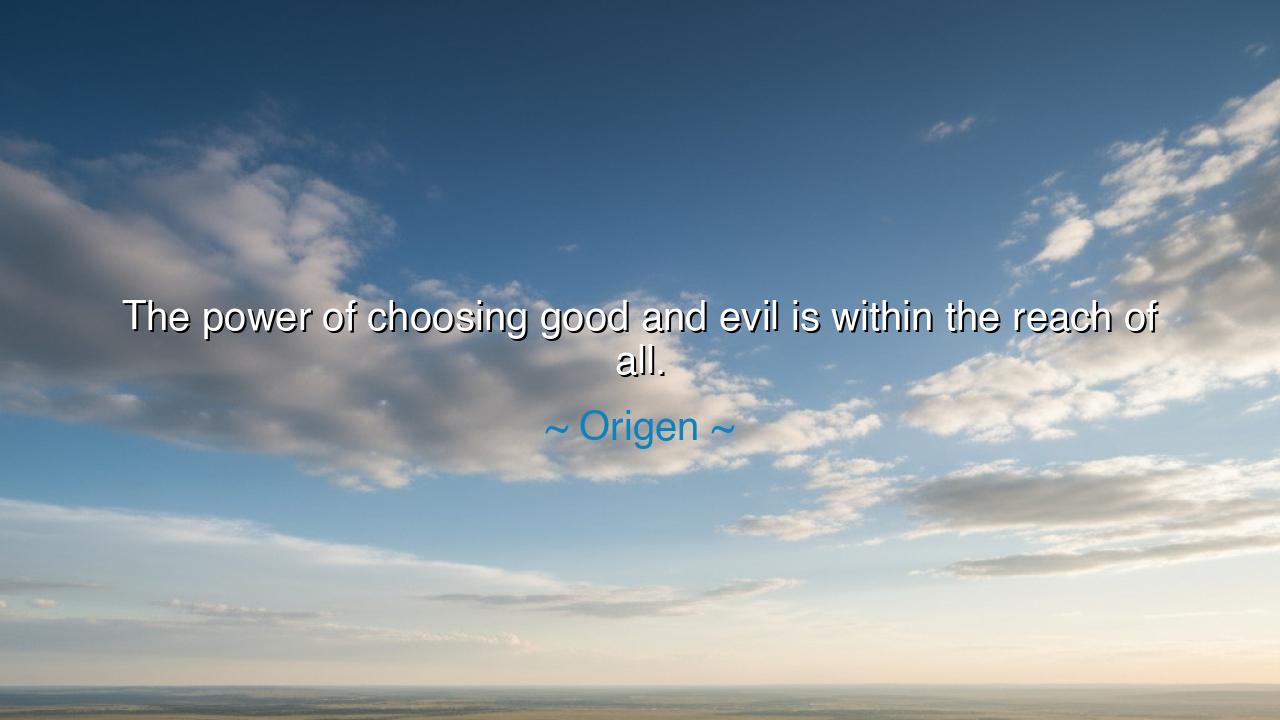
The power of choosing good and evil is within the reach of all.






The ancient teacher Origen spoke a truth that cuts through the ages: “The power of choosing good and evil is within the reach of all.” These words remind us that no crown, no chains, no station of birth can rob a soul of its sacred gift—choice. Kings may wield armies, beggars may wander in rags, yet both alike carry within them the same torch: the freedom to turn toward good or sink into evil. This is the birthright of humanity, a fire placed in our hands by the Creator, never to be extinguished.
This teaching arose in the early centuries of the church, when men and women wrestled with questions of fate and freedom. Against those who believed that destiny alone bound the steps of humankind, Origen declared that free will was the foundation of virtue. For what worth is goodness, if it is compelled? And what meaning has evil, if no one could resist it? Thus he proclaimed that the soul stands ever at the crossroads, and in its every breath it chooses the path it will walk.
Consider the life of Sophie Scholl, the young German student who, in the midst of Nazi tyranny, chose to resist. She and her companions of the White Rose movement printed leaflets denouncing the regime, knowing that death was the price of their defiance. She was captured, condemned, and led to the guillotine. In that hour, she could have begged for mercy, recanted, and lived. Yet she chose good, though it cost her life, saying, “How can we expect righteousness to prevail when there is hardly anyone willing to give himself up for a righteous cause?” Her choice echoes Origen’s truth—that even in the grip of evil powers, the soul remains free.
The ancients often likened the heart of man to a battlefield, where angels and demons contend. But Origen teaches us that the final sword is not in their hands—it is in ours. Each act of kindness or cruelty, each word of truth or deceit, tilts the scales of eternity. The power is small enough to be exercised in silence, yet vast enough to alter the destiny of nations.
Therefore, O seekers, never say, “I had no choice.” For the gods themselves gave you the mightiest gift: the freedom to choose good or evil. To walk in goodness is to ascend toward light, to choose evil is to descend into shadow. But the path lies ever open, and the decision is always yours. Guard it, honor it, and wield it with courage, for upon this sacred freedom rests the fate of the soul.






NANguyen Ngoc Ai
I appreciate the empowerment in this quote, but I also feel a bit of unease. It suggests that everyone has the same power to choose, which feels like a call to responsibility. But does this statement account for the differences in people’s experiences and knowledge? Can someone who’s never been taught the value of kindness or morality really choose good? I’m curious if Origen’s view of choice considers the complexities of upbringing and personal growth.
TTDo Thi Tu
This quote feels deeply thought-provoking. It makes me reflect on how often we blame others or circumstances for the choices people make. Origen seems to imply that the ability to choose is inherent in all of us. But I wonder, how do we reconcile this idea with situations where people face immense pressure or trauma? Can we still hold people accountable for their choices when their options seem so limited?
DNnguyen dinh nguyen
Origen’s perspective really makes me think about the nature of free will. The idea that the power to choose between good and evil is accessible to all seems both simple and profound. But is it really that straightforward? What about the complexities of human psychology, societal influences, or circumstances that limit choices? Can we truly always choose good, or is the line between right and wrong often blurred by external factors?
TLNguyen thi le
I find this quote from Origen both empowering and challenging. It suggests that everyone, regardless of their circumstances, has the ability to choose between good and evil. But can this be true in every situation? What about people born into circumstances where evil or wrongdoing feels like the only option for survival? Does this idea assume a level of agency that not everyone possesses? I’d love to hear how others interpret the concept of choice in relation to this quote.